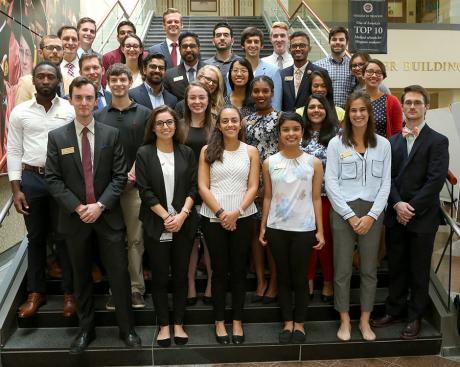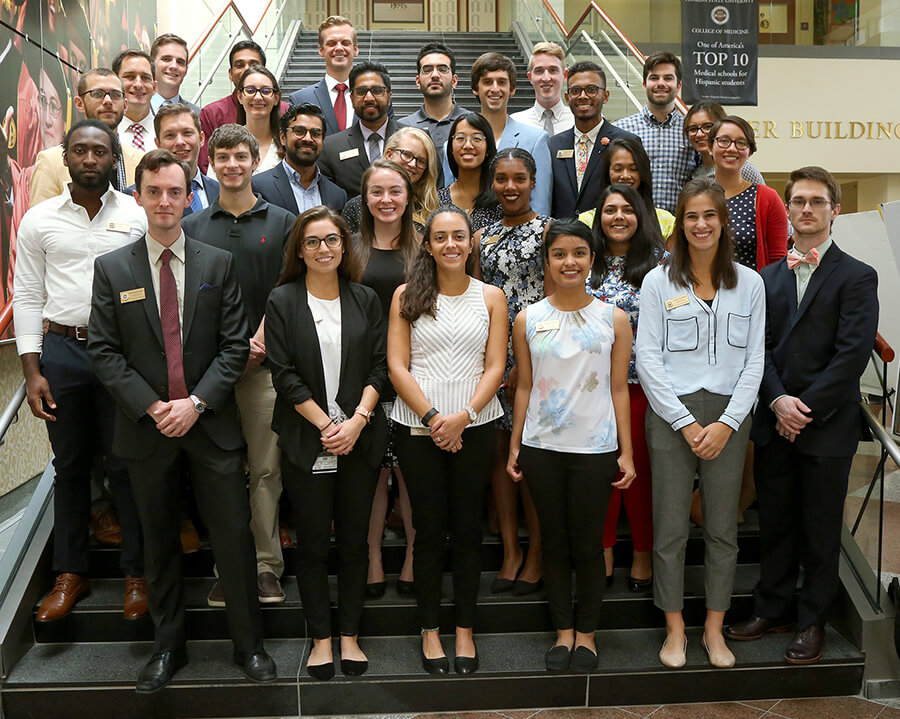Merging medical research and clinical training


October 2017
Even before they complete medical school, some M.D. candidates are doing behind-the-scenes research to help patients and contribute to the world of medicine. At the College of Medicine, their chief outlet since 2005 has been the Summer Research Fellowship program.
That’s how second-year student Samantha Pavlock, for example, spent her summer studying the effects of chemotherapy on brain function.
“A lot of cancer patients who are undergoing chemotherapy report symptoms called ‘chemo brain,’” said Pavlock. “They have problems with learning, memory and attention. We don’t know if it’s because of psychosocial factors such as stress from their diagnosis, or if it’s because of the chemo agent itself. We studied this in animal models so we could eliminate the confounding psychosocial aspects.”
Through the program this past summer, Pavlock and 27 fellow med students received stipends to conduct Ph.D.-level research in biomedical and clinical sciences to gain a deeper understanding of issues and cases they’ll face as physicians.
“My preliminary study shows that there may be certain deficits in pre- and postmenopausal animal models and that chemo may be causing some of these deficits directly,” said Pavlock. “One hypothesis is that the chemo agent causes inflammation. If it does, we can treat patients with anti-inflammatories before and during treatment so maybe they’ll have fewer deficits.”
Findings, even preliminary ones, help Pavlock see her efforts as worthwhile.
“When you’re doing research all summer, working with animals and analyzing data, you can kind of get lost asking, ‘How can I apply this?’” she said. “But then at the end when you put all the results together, you’re able to see how it can actually make a difference in patients.”
After conducting research for 10 weeks, last summer’s research fellows attended the Student Summer Research Fellows Grand Rounds and poster session in mid-October to present their findings.
“The beauty of this program is that you don’t have to wait until you’re a doctor to try to answer these medical questions. You don’t need an ‘M.D.’ behind your name to get started,” said second-year med student Randy Ahluwalia, whose research poster was selected as the clinical sciences winner.
Ahluwalia studied walking patterns in patients with Parkinsonism and Parkinson’s disease to understand how gait cadence and lack of arm swinging decrease stability and increase the risk of falls.
“My colleague Evan Fitzgerald and I had to give a midsummer presentation about our project, a giant roundtable discussion with research faculty and clinical faculty,” said Ahluwalia. “Seeing how the people doing the research and inventing the therapies communicate with the doctors that actually implement it has been one of my favorite experiences here. That blend of knowledge is how we treat patients.”
Increasing research interests from students led the Division of Research and Graduate Programs and Office of the Dean to expand the program and fund 28 student research projects in 2017, more than double the number of awards from 2015 and 2016.
“We funded more students than ever before, which aligns with general trends that medical students are becoming more and more likely to want research experiences,” said Suzanne Baker, assistant dean for graduate programs and medical student research. “We are lucky to have a wide range of research occurring at the College of Medicine from faculty mentors across all departments.”
The summer research fellowships have funded 194 student projects since their inception in 2005. Research experiences not only bolster med students’ residency applications, but provide direction and inspiration to help them navigate their opportunities after med school.
“I found more of my passion with the clinical side of research, which has driven me to look into different residency programs that focus on clinical research so they fit my desired career path,” said second-year med student Christopher Hahn.
Hahn’s research project focused on primary care physicians’ comfort, knowledge and training level on taking sexual histories with LGBTQ patients. “I definitely see myself doing research as a clinician and hopefully using my research to make changes that will ultimately benefit different communities,” he said.
Similarly, Pavlock and Ahluwalia plan to continue.
“I don’t think I’m ever going to stop researching,” Ahluwalia said. “I’m going to continue looking for mentors to help cultivate some of the areas that I’m interested in. Then, as a physician, I hope to be behind the design of some of these projects and really spearheading them.”
2017 FSU College of Medicine Summer Research Fellowship Projects
Ashraf Abdulhalim
“Identification of the Acetylation Signature of Cardiac Sarcomeric Proteins in Failing and Non-Failing Human Cardiac Tissue: An Acetyl-Proteomics Study”
Mentor: Jose Pinto
Randy Ahluwalia
“Effect of Intentional Arm Swing on Gait Cadence and the Functional Ambulatory Profile in Parkinson's Patients”
Mentor: Robert Watson
Hansley Bobo
“Cognitive Task-Based Hemodynamic Changes in the Prefrontal Cortex in Persons with a History of Obesity, Diabetes Mellitus Type-II, Hypertension and Cardiovascular Disease: A Functional Near-Infrared Spectroscopy Study.”
Mentor: Pascal Jean-Pierre
Hoai Bui
“Contraceptive Preferences of Patients Using a Contraceptive Decision Support Tool”
Mentor: Christine Dehlendorf
Edward Corty
“How Do State-Level Policies Related to Food Security Influence Health Outcomes in Florida, Texas and California?”
Mentor: Les Beitsch
Ryan Earwood
“LARP6/PIH1D3 Interaction as a Possible Cause of Primary Ciliary Dyskinesia”
Mentor: Yoichi Kato
Christopher Hahn
“Assessment of Primary Care Physicians’ and Residents’ Knowledge, Comfort and Training with Sexual History Taking in LGBTQ Patients”
Mentor: Jonathan Appelbaum
Jacob Hentges
“Do Physicians and Nursing Staff in Regional Emergency Departments Have the Knowledge and Skills to Recognize the Signs of Human Trafficking in Patients Who Present to Their Facilities for Healthcare, and to Connect Patients with Community Resources?”
Mentor: Suzanne Harrison
Murali Iyyani
“Determining the Required Phosphorylation Sites of Dbf4-Dependent Kinase (DDK) on the Minichromosome Maintenance Proteins (MCM2 and MCM4), Which Is Essential for the Initiation of DNA Replication in Human Cells and Is Expressed at High Levels in Several Different Cancers”
Mentor: Daniel Kaplan
Chelsea Life
“TNNC1: A True Pathogenic Gene?”
Mentor: Jose Pinto
Shannon Lyons
“Analysis of Gait in Multiple Sclerosis Under Conditions of Low-Contrast Sensitivity with and Without High-Contrast Yellow Lenses”
Mentor: Charles Maitland
Kristin Magrini
“Molecular Determinants of Keloid Treatment”
Mentor: Akash Gunjan
Taylor Maramara
“Among Women Who Have Never Been Diagnosed with Breast Cancer but Have Significant Family History of Breast Cancer (Mother, Daughter or Sister Diagnosed Before Age 50), Are There Racial-Ethnic Disparities in Who Receives Genetic Testing?”
Mentor: George Rust
Cordy McGill-Scarlett
“Initial Assessment of the Generalizability over Time of the ACTS 2 Cognitive-Behavioral Intervention on the Effectiveness of Participants' Caregiving Techniques”
Mentor: Robert Glueckauf
Cilia Nazef
“Do States with a Lower Social Determinant of Health Index (Fewer SDH Facilitators), with Respect to Health Care Access, Have Poorer Health Outcomes?”
Mentor: Les Beitsch
Scott Nelson
“Racial and Socioeconomic Variation in Knowledge of Safe Infant Sleep Spaces”
Mentor: Joseph Grzywacz
Bhavi Patel
“Accelerating Healing of Dermal Wounds in the Elderly”
Mentor: Michael Blaber
Samantha Pavlock
“Does the Breast Cancer Chemotherapy Agent Cyclophosphamide Decrease Cell Proliferation in the Brain, Impair Cognitive Function and Contribute to Depressive-Like Symptoms?”
Mentor: Pradeep Bhide
Arjith Rathakrishnan
“Role of Adiponectin in Exercise Training-Induced Adaptations of the Cardiovascular System”
Mentor: Judy Delp
Marvin Rhodes
“Understanding the PCORnet OneFlorida Database: A Comparison with the Florida All Payer Inpatient Database Using Two Chronic Conditions (COPD and Prostate Cancer)”
Mentor: Henry Carretta
Max Richardson
“Comparing Rural and Urban Utilizers of Emergency Departments in Management of Acute-on-Chronic Disease Exacerbations”
Mentor: George Rust
Alexa Rivera
“Identification of Environmental Factors that Contribute to Childhood Obesity from the Perspective of a Latino Migrant Farm-Working Population Residing in a Rural Area of Southwest Florida”
Mentor: Javier Rosado
Megan Rivera
“Identification of a Biomarker for Chronic Disease in Children Exposed to High Levels of Toxic Stress”
Mentor: Elena Reyes
Derek Schwabe-Warf
“Examining the Association Between Serum Uric Acid Concentrations and Agitation in Patients Living with Dementia”
Mentor: Antonio Terracciano
Tyler Teurlings
“Hip Resurfacing”
Mentor: Andrew Wong
Klariz Tucker
“Estimating the Out-of-Pocket Costs of Adults with Anxiety”
Mentor: Jeffrey Harman
Christopher Williams
“Use of an Unloader Brace to Prolong the Decision to Perform Total Knee Arthroplasty in Patients with Osteoarthritis”
Mentors: Jason Oberste, Andrew Wong, Phillip Worts
D’andre Williams
“Low-Dose Ketamine and Its Addictive Effects Following Alcohol Exposure”
Mentor: Mohamed Kabbaj

